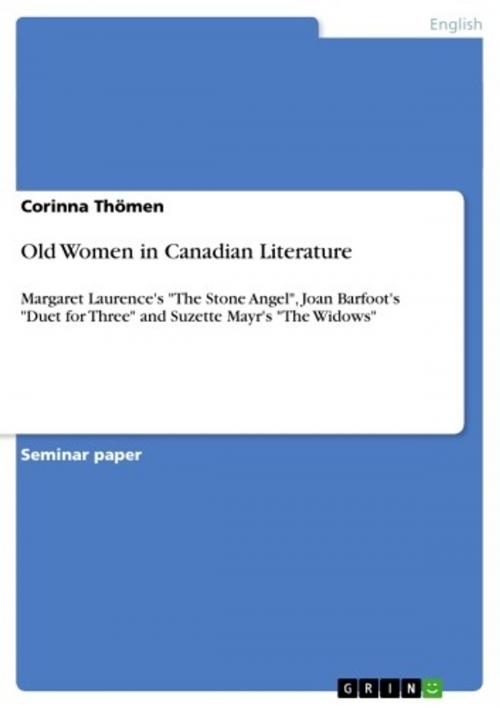Old Women in Canadian Literature
Margaret Laurence's 'The Stone Angel', Joan Barfoot's 'Duet for Three' and Suzette Mayr's 'The Widows'
Nonfiction, Entertainment, Drama, Anthologies| Author: | Corinna Thömen | ISBN: | 9783638731089 |
| Publisher: | GRIN Publishing | Publication: | May 24, 2007 |
| Imprint: | GRIN Publishing | Language: | English |
| Author: | Corinna Thömen |
| ISBN: | 9783638731089 |
| Publisher: | GRIN Publishing |
| Publication: | May 24, 2007 |
| Imprint: | GRIN Publishing |
| Language: | English |
Seminar paper from the year 2005 in the subject American Studies - Literature, grade: 2,3, Ernst Moritz Arndt University of Greifswald (Institut für Anglistik/Amerikanistik), course: Canadian Women Novelists, 9 entries in the bibliography, language: English, abstract: Everyone of us is concerned with the process of aging. As soon as we are born, our body starts to grow older and with the years it becomes visibly more and more. Aging is the natural course of life but in our society it often seems to be an uncomfortable subject to talk about. Although the situation of the elderly has improved throughout the last years, older people are often neglected and marginalized by society. They are often associated with negative images like being helpless, rigid and useless. The study of aging is very complex and can be examined from many perspectives, for example from a biological, a sociological, or a psychological point of view. This paper focuses on aging in literature, especially in the writings of Canadian women authors, in which old age is a relatively new subject. The aim of this paper is to point out how Canadian women writers deal with the topic of old age, especially that of women, and what kind of image about old age they want to transmit through their stories. Are they depicting old women in stereotypical ways or do they try to reveal and change those stereotypes? The novels that will be discussed here, are Margaret Laurence's The Stone Angel (1964), Joan Barfoot's Duet for Three (1985), and The Widows (1998) by Suzette Mayr. Before analyzing different aspects of aging in these novels, it will be useful to have a look at the social construction of age. Afterwards, I will explore different issues of aging that play important roles in the novels and also in our society. Starting with the aspect of physical aging and the impact it has on the different female characters, the second point will analyze the relationships of grandmothers and granddaughters. Furthermore, it will be interesting to see how the authors deal with the widespread negative images of nursing homes and the fear that is often associated with those places. Finally, this paper will explore the representation of sexuality in the novels. How are older people depicted in terms of sexual relationships? Are they really as asexual as many people think or is this one of many misperceptions about old people?
Seminar paper from the year 2005 in the subject American Studies - Literature, grade: 2,3, Ernst Moritz Arndt University of Greifswald (Institut für Anglistik/Amerikanistik), course: Canadian Women Novelists, 9 entries in the bibliography, language: English, abstract: Everyone of us is concerned with the process of aging. As soon as we are born, our body starts to grow older and with the years it becomes visibly more and more. Aging is the natural course of life but in our society it often seems to be an uncomfortable subject to talk about. Although the situation of the elderly has improved throughout the last years, older people are often neglected and marginalized by society. They are often associated with negative images like being helpless, rigid and useless. The study of aging is very complex and can be examined from many perspectives, for example from a biological, a sociological, or a psychological point of view. This paper focuses on aging in literature, especially in the writings of Canadian women authors, in which old age is a relatively new subject. The aim of this paper is to point out how Canadian women writers deal with the topic of old age, especially that of women, and what kind of image about old age they want to transmit through their stories. Are they depicting old women in stereotypical ways or do they try to reveal and change those stereotypes? The novels that will be discussed here, are Margaret Laurence's The Stone Angel (1964), Joan Barfoot's Duet for Three (1985), and The Widows (1998) by Suzette Mayr. Before analyzing different aspects of aging in these novels, it will be useful to have a look at the social construction of age. Afterwards, I will explore different issues of aging that play important roles in the novels and also in our society. Starting with the aspect of physical aging and the impact it has on the different female characters, the second point will analyze the relationships of grandmothers and granddaughters. Furthermore, it will be interesting to see how the authors deal with the widespread negative images of nursing homes and the fear that is often associated with those places. Finally, this paper will explore the representation of sexuality in the novels. How are older people depicted in terms of sexual relationships? Are they really as asexual as many people think or is this one of many misperceptions about old people?















